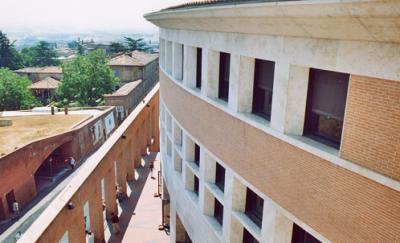
The Department of Political and International Sciences
The Department of Political and International Sciences was born in continuity with the Faculty of Political Science, established in Siena in 1997, as heir to the course of studies first activated in 1939-40. Today as then, what most characterizes its educational offer is the multidisciplinary dimension: its educational offer is aimed at students interested in careers in the various sectors of public administration, traditionally in the administration of the Interior and Foreign Affairs and in local authorities, in private companies, in the varied world of politics, journalism and communication in general, in European institutions, in international non-governmental organizations (NGOs) and those engaged in national and international cooperation, in the Third Sector, in cooperatives for social welfare, in the management of human resources, in trade unions.
The three-year degree course in Political Science (L 36) is divided into three curricula: Historical-Political, International Studies and Government and Administration, in which the disciplines of study are related to the field of law, economics, history, political science, sociology, statistics, demography, languages. It should be noted that for some years now the degree course in Political Science has also been provided in teledidactics. This is followed by three Master's Degree courses in Administrative Sciences (LM 63) - with curricula in Tributes, Law and Economics and Communication, Territorial Marketing and Tourism -, in Social Sustainability and Welfare Management (LM 87) and in International Sciences (LM 52) - with curricula in International and Diplomatic Sciences, Development and International Cooperation and European Studies, the latter taught entirely in English. With regard to the European Studies curriculum, this is an important adaptation of the Dispi to the needs of internationalization of our University, a path undertaken some years ago and which has already achieved excellent results, welcoming Italian and foreign students from the most varied parts of the world. Speaking of internationalization, I would like to remind you that the former Faculty of Political Science and now the Dispi are already at the forefront of Erasmus exchanges, providing many students with the possibility of a period of study abroad every year, both to take exams and to develop their thesis and, lastly, also for internship periods. The educational offer as a whole - both in Italian and English - is characterized by experiences of internships, internships and training workshops, useful for a first contact with the world of work.
Being a Department strongly focused on contemporary issues, the Dispi has organized and organizes many seminars and conferences, lectures, book presentations, meetings with scholars of international level, senior members of the public administration such as diplomats, magistrates, prefects, senior military officers, institutional leaders, operators of international humanitarian organizations, journalists, senior managers, for the deepening of the topics covered by the courses or simply as a response to the needs of analysis and interpretation of today's reality.
I would also like to mention two aspects that are normally not sufficiently highlighted: the first is the possibility for the student to use an efficient didactic secretariat, with a good front-office service and a back-office structure that allows excellent response times with regard to the main administrative practices (student practices, didactic organization, lesson timetable, exams, thesis, internships, etc...). Secondly, Il Dispi makes use of a structure, the Presidio Mattioli, equipped with large and comfortable study spaces, and in which is located the Circolo Giuridico, the very rich library born in the last years of the nineteenth century which consists of more than 400,000 volumes published from modern times to the present day and mainly of legal, historical, political.
Also for these reasons, the Dispi is an ideal environment to study, to grow, to be trained in an appropriate way to the new times. It only remains for me to welcome the freshmen and wish all our students a fruitful academic year.
Prof. Gerardo Nicolosi
(Director)
note